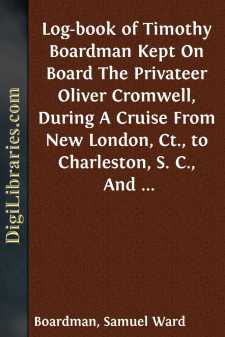Categories
- Antiques & Collectibles 13
- Architecture 36
- Art 48
- Bibles 22
- Biography & Autobiography 813
- Body, Mind & Spirit 142
- Business & Economics 28
- Children's Books 15
- Children's Fiction 12
- Computers 4
- Cooking 94
- Crafts & Hobbies 4
- Drama 346
- Education 46
- Family & Relationships 57
- Fiction 11828
- Games 19
- Gardening 17
- Health & Fitness 34
- History 1377
- House & Home 1
- Humor 147
- Juvenile Fiction 1873
- Juvenile Nonfiction 202
- Language Arts & Disciplines 88
- Law 16
- Literary Collections 686
- Literary Criticism 179
- Mathematics 13
- Medical 41
- Music 40
- Nature 179
- Non-Classifiable 1768
- Performing Arts 7
- Periodicals 1453
- Philosophy 64
- Photography 2
- Poetry 896
- Political Science 203
- Psychology 42
- Reference 154
- Religion 513
- Science 126
- Self-Help 84
- Social Science 81
- Sports & Recreation 34
- Study Aids 3
- Technology & Engineering 59
- Transportation 23
- Travel 463
- True Crime 29
Log-book of Timothy Boardman Kept On Board The Privateer Oliver Cromwell, During A Cruise From New London, Ct., to Charleston, S. C., And Return, In 1778; Also, A Biographical Sketch of The Author.
Categories:
Description:
Excerpt
BIOGRAPHICAL SKETCH.
There is still preserved a letter from England, written in a fine hand, with red ink, dated Obeydon? Feb. 5, 1641, and directed,
“to her very loveing sonne
Samuel Boreman,
Ipswich in New England
give this with
haste.”
The letter is as follows:
“Good sonne, I have receaved your letter: whereby I understand that you are in good health, for which I give God thanks, as we are all—Praised be God for the same. Whereas you desire to see your brother Christopher with you, he is not ready for so great a journey, nor do I think he dare take upon him so dangerous a voyage. Your five sisters are all alive and in good health and remember their love to you. Your father hath been dead almost this two years, and thus troubleing you no further at this time, I rest, praying to God to bless you and your wife, unto whome we all kindly remember our loves.
Your ever loving mother,
“Julian Borman.”
This letter exhibits many of the characteristics of the Puritans to whom the Bormans belonged. They were intensely religious; this short letter contains the name of God three times and speaks of both prayer and praise. The Puritans were an intelligent people, reading and writing; this letter is a specimen of the correspondence carried on between the earliest settlers and their kindred whom they had left in England. They were an affectionate people, “remembering their loves” to one another; and praying, for one another, as this mother did for her son and his wife. This short letter has the word “love” four times.
They were a persistent people, those who came hither did not shrink from the hardships around them. They came to stay, and sent back for their friends. Samuel desired Christopher to follow him. Many of their families were large, there were at least nine members of this Puritan household. Samuel was born probably about 1610; he had emigrated from England in 1635 or 1636. His name is found at Ipswich, Mass., about 1637 where land was assigned to him. Ipswich had been organized in 1635 with some of the most intelligent and wealthy colonists. His father died after Samuel’s emigration to America, in 1639. His wife’s name was Mary; their oldest child, so far as we have record, was Isaac, born at Wethersfield, Ct., Feb. 3, 1642. He probably journeyed through the wilderness from Ipswich, Mass., which is twenty-six miles north of Boston, to Wethersfield, Ct., about one hundred and fifty miles, in 1639 or 1640.
Between 1630 and 1640 many of the best families in England sent representatives to America. It is said that Oliver Cromwell was at one time on the point of coming. Between February and August, 1630, seventeen ships loaded with families, bringing their cattle, furniture and other worldly goods, arrived. One ship of four hundred tons brought one hundred and forty passengers, others perhaps a larger number. Among them were Matthew and Priscilla Grant, from whom Gen. Grant was of the eighth generation in descent. Bancroft says, “Many of them had been accustomed to ease and affluence; an unusual proportion were graduates of Cambridge and Oxford....


